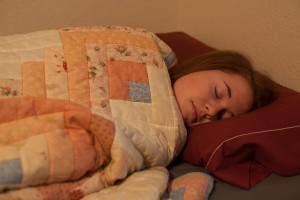
Life as a college student involves balancing school, work and a social life, which often means a limited amount of sleep.
Dallin Shirley, a junior studying accounting, admitted that while he now averages around eight hours of sleep a night, he hasn’t always had good sleeping habits. “As a freshman I used to fall asleep in class all the time because I’d go to bed at like 1:30 in the morning,” he said.
Shirley added that 1:30 a.m. was actually early; he’d often go to bed much later. He said his sleeping habits changed after he returned from his mission.
Shirley’s wife, Caitlin, said she also functioned on very little sleep while she was single. “Before we got married, I’d run on like four or five hours of sleep,” she said.
Bruce Bailey, an exercise science professor at BYU, did a study on healthy sleep habits. “Roughly eight hours (of sleep) is optimal, but there’s a range. Not everyone needs the same amount,” he said. Bailey conducted a study showing that getting too little or even too much sleep is linked to higher body fat.
Bailey said getting between 6.5 to 8.5 hours of sleep each night is necessary for a college student to live a healthy life. He explained that it is the pattern of sleep, rather than the duration of sleep, that is a stronger indicator of health and that people will have lower body fat if they “get up and go to bed at roughly the same time.”
College students are busy, but Bailey said it is primarily the social aspect of their lifestyle that complicates getting enough sleep. He said it’s important to value sleep and recognize its impact in order to develop healthy sleeping habits.
Caitlin and Dallin Shirley both agreed that it’s usually friends or family that keep them from going to bed, but even with those distractions, they’re now able to have a pretty consistent sleep schedule. “We usually go to bed at around 10:30 every night,” Caitlin Shirley said.
“Force yourself to get up at the same time, and eventually you’ll go to bed at the right time because you’re tired,” Bailey said with a smile.
Another recommendation Bailey said he gives to students is using light as a cue. “At our house, we set our lights on timers so they go off at a certain time,” he said.
Bailey said using light in this way helps his family know when it’s time to start winding down and get ready for sleep. He added that they use the same timers for lights to turn on in the morning, so his family knows when it’s time to start waking up.
To learn more about Bailey’s study on sleep, visit news.byu.edu/archive13-nov-sleepweight.aspx.




